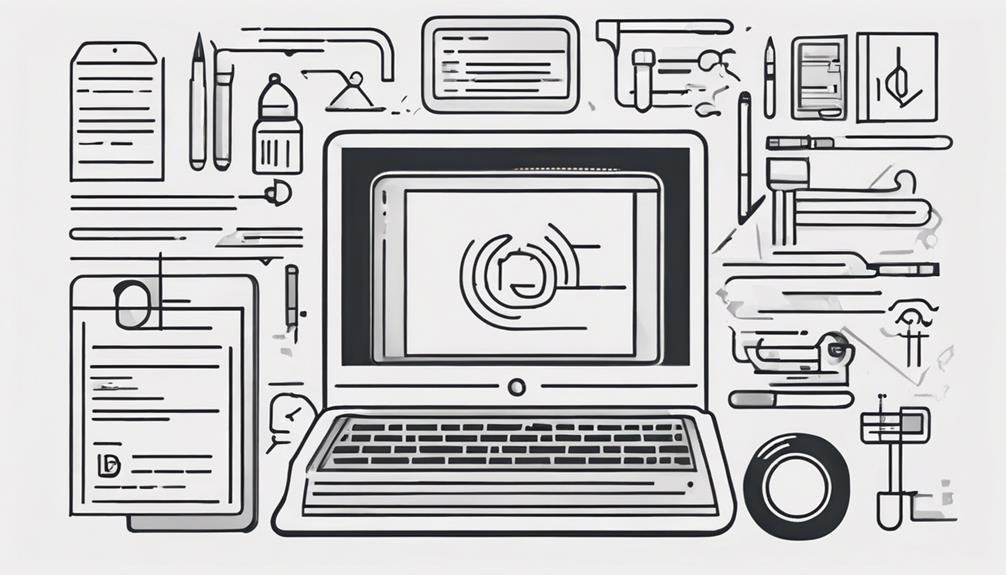You definitely need to include skills on your resume to showcase your value to potential employers and improve your chances of securing your desired job. By highlighting a mix of hard and soft skills that align with the job description, you demonstrate your capabilities effectively. Balancing technical proficiency with interpersonal abilities is key to standing out in the job market and grabbing recruiters' attention. Emphasize key skills at the top of your resume, provide specific examples of skill utilization, and tailor your skills section accordingly. This strategic approach will optimize your resume and increase your chances of landing that interview.
Key Takeaways
- Skills on a resume are crucial for showcasing your abilities and qualifications to potential employers.
- Including a mix of hard and soft skills demonstrates your technical expertise and interpersonal strengths.
- Tailoring your skills section to match the job description increases your chances of landing an interview.
- Highlighting key skills like communication and problem-solving can help you stand out in the job market.
- Balancing hard skills (e.g., technical proficiency) with soft skills (e.g., teamwork) is essential for a well-rounded resume.
Essential Skills for Resume

When crafting your resume, it's essential to highlight a diverse range of crucial skills that showcase both your technical expertise and interpersonal strengths. Including a mix of hard skills, which demonstrate your specific qualifications, and soft skills, which highlight your interpersonal abilities, can greatly enhance your job application. Tailoring these skills to match the job description not only makes your resume more appealing to hiring managers but also increases your chances of landing an interview. By showcasing relevant skills on your resume, you demonstrate your value to potential employers and make it easier for recruiters to assess your qualifications quickly. Remember, the key is to strike a balance between hard and soft skills, drawing from your work experience to showcase a well-rounded skill set that aligns with the requirements of the position you are applying for. By doing so, you increase your chances of standing out among other applicants and securing the job you desire.
Crafting an Effective Skills Section
To craft an effective skills section on your resume, it is important to strategically highlight the key abilities that align with the specific job requirements. Including both hard and soft skills that are relevant to the position is vital. Tailor your skills section by incorporating keywords from the job description to show recruiters that you possess the qualifications they are seeking. Present your skills in a clear and organized manner using bullet points for easy readability. To make your resume more impactful, consider including quantifiable achievements that demonstrate your skills in action. An effective skills section can help you stand out to recruiters and showcase your qualifications in a compelling way. By crafting a tailored skills section that aligns with the job requirements and includes quantifiable achievements, you can make a strong impression on potential employers.
Showcasing Your Skillset

As you aim to impress recruiters and secure that coveted interview, effectively showcasing your skillset can be the key to standing out among other applicants. Including relevant skills on your resume can increase your chances of landing an interview by up to 60%. When crafting your resume, pay attention to the job description and tailor your skills section to match what the hiring manager is looking for. Highlight skills like communication, problem-solving, and teamwork, as these are valued across various industries. To truly showcase your skills, provide specific examples of how you've utilized them in previous roles. Remember, recruiters spend only about 6 seconds reviewing a resume, so make sure your skillset is front and center. By demonstrating your capabilities through a tailored skills section with specific examples, you can notably increase your chances of landing an interview and ultimately securing the job you desire.
Balancing Hard and Soft Skills
Achieving a balance between hard and soft skills is crucial when crafting a well-rounded resume that appeals to employers across different industries. Finding the right equilibrium between technical proficiency and interpersonal abilities is vital to stand out in the competitive job market. Here are some tips to help you strike a balance between hard and soft skills on your resume:
- Highlight Your Technical Proficiency: Showcase your hard skills related to the job you are applying for, such as programming languages or data analysis tools.
- Emphasize Your Interpersonal Abilities: Demonstrate your soft skills like communication, teamwork, and leadership to show employers your capacity for effective collaboration.
- Tailor Your Resume to the Job Description: Customize your resume to include a mix of hard and soft skills that align with the requirements of the specific job you are applying for.
- Show Versatility: Illustrate how your combination of hard and soft skills enables you to excel in tasks that demand both technical expertise and effective communication.
Optimizing Your Resume With Skills

Boosting your resume with the right set of skills is necessary for capturing the attention of potential employers in today's competitive job market. To optimize your resume effectively, it's essential to align your skills with the job description and strategically highlight them in the top third of your resume. Utilizing a mix of hard and soft skills can showcase a well-rounded professional profile, increasing your chances of landing an interview by up to 30%.
When crafting your resume skills section, consider tailoring it to match the specific job requirements to make your resume stand out to recruiters. Remember, recruiters only spend an average of 7.4 seconds reviewing a resume, so emphasizing key skills is crucial for grabbing their attention. By incorporating relevant skills and strategically placing them within your resume, you can improve your chances of getting noticed by applicant tracking systems (ATS) and potential employers.